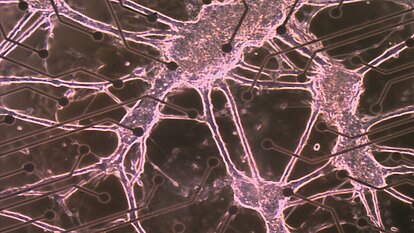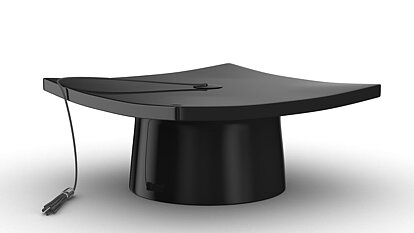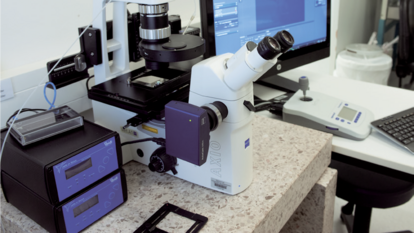Themenfelder
| Themenfelder laufender Arbeiten | Betreuer*in an der HS KL |
| TRAPP – Nanocarrier in Trägermatrix für Transdermale Applikationen | Prof. Dr. Hildegard Möbius |
| Dotted Design for OLEDs | Prof. Dr. Hildegard Möbius |
| Development of Superparamagnetic Functional Materials for Hyperthermia Applications | Prof. Dr. Hildegard Möbius |
| Einfluss protektiver Wirkstoffe aus Pilzen und Cyanobakterien auf die neuronale Erregbarkeit sowie auf die intrazelluläre Verarbeitung neurotropher Faktoren | |
| Random nano-structured interfaces for bioanalytical applications | |
| Mikro- und nanostrukturierte hartmagnetische Materialien und Bauteile für die mikrotechnische Anwendung | Prof. Dr. Monika Saumer |
| Nano-Oberflächen und Zelladhäsion | Prof. Dr. Monika Saumer |
| Regulationsmechanismen zur Freisetzung von Matrixmetalloprotease 9 | Prof. Dr. Bernd Bufe |
| Beitrag von Formylpeptidrezeptoren zur neurodegenerativen Erkrankungen | Prof. Dr. Bernd Bufe |
| Nutzung von bakteriellen Signalpeptiden zur Blutdiagnostik | Prof. Dr. Bernd Bufe |
| Modulation der gastrointestinalen neuroimmunologischen Interaktion durch biologische Wirkstoffe am Beispiel der Alzheimer/Parkinsonerkrankung | |
| Einflüsse antioxidativer Substanzen auf die Auswirkungen pathologischer Peptide im Darm | Prof. Dr. Karl-Herbert Schäfer |
| Einfluss pathologischer Peptide auf das ENS | Prof. Dr. Karl-Herbert Schäfer |
| Transplantation von Stammzellen im Darm | Prof. Dr. Karl-Herbert Schäfer |
Doktoranden
Themen abgeschlossener Arbeiten | Betreuer*in an der HS KL |
|---|---|
Entwicklung der elektrochemischer Abscheidung von NiFeMo und deren Anwendung in der Magnetfeldsensorik | Prof. Dr. Monika Saumer |
Entwicklung von 3D-Elektroden für biomedizinische Anwendungen | Prof. Dr. Monika Saumer |
Random nanostructured interfaces for bioanalytical applications | Prof. Dr. Monika Saumer |
Charakterisierung galvanisch hergestellter nanokristalliner Nickel-Eisen-Legierungen | Prof. Dr. Joachim Ernst Hoffmann |
Einflüsse calorischer Restriktion auf den Darm | Prof. Dr. Karl-Herbert Schäfer |
Charakterisierung neuraler enterischer Stammzellen | Prof. Dr. Karl-Herbert Schäfer |
Etablierung eines mesenterialen perfusionssystems zur Evaluierung antinflammatorischer Substanzen | Prof. Dr. Karl-Herbert Schäfer |
Intrinsische Stimulation neuraler Stammzellen | Prof. Dr. Karl-Herbert Schäfer |
Chemische und Physikalische Stimulierung neuraler Stammzellen des zentralen und peripheren Nervensystems: Ansätze zur Behandlung neurodegenerativer Erkrankungen durch intrinsische Stimulati | Prof. Dr. Karl-Herbert Schäfer |
Einflüsse ex- und intrinsischer Faktoren auf neurale Stammzellen | Prof. Dr. Karl-Herbert Schäfer |
Etablierung und Validierung eines Darmperfusionssystems und Evaluierung von neuen antiinflammatorischen Wirkstoffen aus Pilzen zur Behandlung entzündlicher Darmerkrankungen | Prof. Dr. Karl-Herbert Schäfer |
Analyse der Interaktion des Mikrobioms mit dem Darmnervensystem | Prof. Dr. Karl-Herbert Schäfer |
Auswirkungen einer kalorienreduzierter Nahrung auf das Darmnervensystem | Prof. Dr. Karl-Herbert Schäfer |
Das enterische Nervensystem als Prädiktor für pathologische Veränderungen und Therapieansprechen bei der Alzheimer-Demenz | Prof. Dr. Karl-Herbert Schäfer |
Einflüsse komplexer Wirkstoffgemische auf die Darmmotilität und - immunität | Prof. Dr. Karl-Herbert Schäfer |
Etablierung eines neuen Messsystems zur elektrophysiologischen Erfassung neuronaler Daten | Prof. Dr. Karl-Herbert Schäfer |
Nutzung nanomodifizierter Antioxidantien zur Behandlung neurodegenerativer Erkrankungen: Arbeiten and in-vivo- und Invitro-Modellen | Prof. Dr. Karl-Herbert Schäfer |
Transplantation neuraler Stammzellen zur Behandlung gastrointestinaler Neuropathien | Prof. Dr. Karl-Herbert Schäfer |
Microtechnical Sensor for Determination of Moisture in Apparel | Prof. Dr. Antoni Picard |
Printed Flexible Multi- Sensory Array Towards Wound Monitoring Applications | Prof. Dr. Antoni Picard |
Thermal based real-time monitoring of cell growth | Prof. Dr. Antoni Picard |
Characterisation of superparamagnetic nanoparticles for biomedical applications with Magnetic Force Microscopy (MFM) | Prof. Dr. Hildegard Möbius |
Human sperm chromatin condensation assessment using Raman spectroscopy and its impact on ICSI induced fertilization and embryonic development | Prof. Dr. Marko Baller |
Identification of novel pahtogen-derived agonists for human and mouse formyl peptide receptors | Prof. Dr. Bernd Bufe |
Comparative Analyses of Murine and Human Formyl Peptide Receptor 3 | Prof. Dr. Bernd Bufe |
Extraction of DNA from difficult samples with an automatable portable system for early detection of intestinal cancer | Prof. Dr. Dr. Oliver Müller |
Etablierung eines fluoreszenzbasierten Zellassays zum Screening potentieller Krebstherapeutika des Wnt-Signalwegs | Prof. Dr. Dr. Oliver Müller |
Zelluläre System zur Testung therapeutisch aktiver Substanzen | Prof. Dr. Dr. Oliver Müller |
Ein Mikrosystem zur Isolierung von DNA aus schwierigen Proben | Prof. Dr. Dr. Oliver Müller |
Neue und schnellere Verfahren zur Isolierung von DNA aus schwierigen Proben und die Analyse des kompletten fäkalen Genoms. | Prof. Dr. Dr. Oliver Müller |
Reduced grapheneoxide based biosensor platform for detecting prostate cancer biomarkers | Prof. Dr. Sven Ingebrandt |
System integration of Graphene Oxide based materials for biosensor applications | Prof. Dr. Sven Ingebrandt |
On-chip integration of SiNW-FETs into different bridge configurations by CMOS processing | Prof. Dr. Sven Ingebrandt |
PEDOT: PSS Organic Electrochemical Transistors for Biosensing | Prof. Dr. Sven Ingebrandt |
2D Nanomaterials as the basis for cost-effective, sensitive and selective DNA-hybridization biosensors with SNP detection capabilities | Prof. Dr. Sven Ingebrandt |
Detection of biomolecules using multivariant data analysis from silicon nanowire field-effect transistor arrays | Prof. Dr. Sven Ingebrandt |
Impedimetric detection of anticancer drug action on individual tumor cells using field-effect transistor devices | Prof. Dr. Sven Ingebrandt |
Label-free detection of biomolecules using silicon nanowire ionsensitive field-effect transistor devices | Prof. Dr. Sven Ingebrandt |
Nanoelectrochemical transducers fabricated by nanoimprint lithography for biosensor applications | Prof. Dr. Sven Ingebrandt |
Readout concepts for label-free biomolecule detection with advanced ISFET and silicon nanowire biosensors | Prof. Dr. Sven Ingebrandt |
Transistor-transfer Function Measurements using Ionsensitive Field-Effect Transistors to Analyze Cell Viability as a Novel Tool for Pharmacological High Throughput Screening | Prof. Dr. Sven Ingebrandt |
Development and process integration of novel 2D nanomaterials for opto-electronic biosensor concepts | Prof. Dr. Sven Ingebrandt |
Kontakt IMS

Sprecherin
- +49 631 3724-5420Monika.Saumer(at)hs-kl(dot)de
- Campus Zweibrücken
- Raum H136





